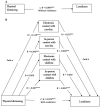Physical distancing is related to fewer electronic and in-person contacts and to increased loneliness during the COVID-19 pandemic among older Europeans
- PMID: 34417963
- PMCID: PMC8379574
- DOI: 10.1007/s11136-021-02949-4
Physical distancing is related to fewer electronic and in-person contacts and to increased loneliness during the COVID-19 pandemic among older Europeans
Abstract
Purpose: During the COVID-19 pandemic older adults are asked to maintain physical distancing, which can be linked to loneliness. While older people are encouraged to use electronic communication to stay socially connected, it remains an open question whether electronic contacts are related to lower loneliness during the pandemic. This study examined the associations of physical distancing during the pandemic with loneliness and the role of in-person and electronic contacts with children and non-kin as explaining these associations across European regions.
Methods: The study used data from Survey of Health, Ageing and Retirement in Europe (SHARE), collected during the COVID-19 pandemic in 2020. Mediation and moderation analyses tested the direct and indirect associations between physical distancing, contact frequency and loneliness, as well as the differences across European regions.
Results: The results indicate that adults who reported higher frequency of physical distancing also felt lonelier during the pandemic. This association was partly explained by social contacts-those who practiced physical distancing maintained less in-person contact with children and non-kin and less electronic contact with non-kin, which were related to feeling lonelier. Adults in Southern European countries felt lonelier and reported more frequent contacts. The moderation analyses showed that the link between physical distancing and loneliness was found in the northern region, but not in the southern and eastern regions of Europe.
Conclusion: This study can indicate that attention should be paid to adults who may struggle to maintain social contacts in light of physical distancing guidelines.
Keywords: Friends; Loneliness; Online; Phone; Social contacts.
© 2021. The Author(s), under exclusive licence to Springer Nature Switzerland AG.
Conflict of interest statement
The authors have no conflict of interest to disclose.
Figures

Similar articles
-
COVID-19 and social distancing: pandemic has altered social relationships and contacts in older adults over 4 years.Front Public Health. 2024 Dec 16;12:1456829. doi: 10.3389/fpubh.2024.1456829. eCollection 2024. Front Public Health. 2024. PMID: 39737450 Free PMC article.
-
Loneliness, Wellbeing, and Social Activity in Scottish Older Adults Resulting from Social Distancing during the COVID-19 Pandemic.Int J Environ Res Public Health. 2021 Apr 24;18(9):4517. doi: 10.3390/ijerph18094517. Int J Environ Res Public Health. 2021. PMID: 33923170 Free PMC article.
-
COVID-19 and Loneliness among Older Adults: Associations with Mode of Family/Friend Contacts and Social Participation.Clin Gerontol. 2022 Mar-Apr;45(2):390-402. doi: 10.1080/07317115.2021.2013383. Epub 2021 Dec 28. Clin Gerontol. 2022. PMID: 34962454 Free PMC article.
-
Extending understanding of grandchild care on feelings of loneliness and isolation in later life : A literature review.Z Gerontol Geriatr. 2021 Aug;54(5):513-516. doi: 10.1007/s00391-020-01776-5. Epub 2020 Aug 27. Z Gerontol Geriatr. 2021. PMID: 32856121 Free PMC article. Review.
-
Social Isolation and Loneliness During the COVID-19 Pandemic: Impact on Weight.Curr Obes Rep. 2021 Sep;10(3):365-370. doi: 10.1007/s13679-021-00447-9. Epub 2021 Jul 23. Curr Obes Rep. 2021. PMID: 34297344 Free PMC article. Review.
Cited by
-
The impact of COVID-19 lockdown stringency on loneliness in five European countries.Soc Sci Med. 2022 Dec;314:115492. doi: 10.1016/j.socscimed.2022.115492. Epub 2022 Oct 30. Soc Sci Med. 2022. PMID: 36343461 Free PMC article.
-
Pandemic Diaries: Lived Experiences of Loneliness, Loss, and Hope Among Older Adults During COVID-19.Gerontologist. 2023 Jan 24;63(1):120-130. doi: 10.1093/geront/gnac104. Gerontologist. 2023. PMID: 35868621 Free PMC article.
-
Loneliness and psychological distress before and during the COVID-19 pandemic: Relationships with social media identity bubbles.Soc Sci Med. 2022 Jan;293:114674. doi: 10.1016/j.socscimed.2021.114674. Epub 2021 Dec 21. Soc Sci Med. 2022. PMID: 34959045 Free PMC article.
-
Remote Communication and Loneliness During the COVID-19 Pandemic: Cross-Sectional Study.J Med Internet Res. 2023 Jul 11;25:e45338. doi: 10.2196/45338. J Med Internet Res. 2023. PMID: 37432730 Free PMC article.
-
Loneliness before and during the COVID-19 pandemic-are unpartnered and childless older adults at higher risk?Eur J Ageing. 2022 Jul 19;19(4):1327-1338. doi: 10.1007/s10433-022-00718-x. eCollection 2022 Dec. Eur J Ageing. 2022. PMID: 35875688 Free PMC article.
References
-
- Wu C, Chen X, Cai Y, Xia J, Zhou X, Xu S, Huang H, Zhang L, Zhou X, Du C, Zhang Y, Song J, Wang S, Chao Y, Yang Z, Xu J, Zhou X, Chen D, Xiong W, Xu L, Zhou F, Jiang J, Bai C, Zheng J, Song Y. Risk factors associated with acute respiratory distress syndrome and death in patients with coronavirus disease 2019 pneumonia in Wuhan, China. JAMA Internal Medicine. 2020 doi: 10.1001/jamainternmed.2020.0994. - DOI - PMC - PubMed
-
- World Health Organization. (2020). Coronavirus disease (COVID-19) advice for the public. Retrieved January 17, 2021, from https://www.who.int/emergencies/diseases/novel-coronavirus-2019/advice-f...
MeSH terms
Grants and funding
LinkOut - more resources
Full Text Sources
Medical

